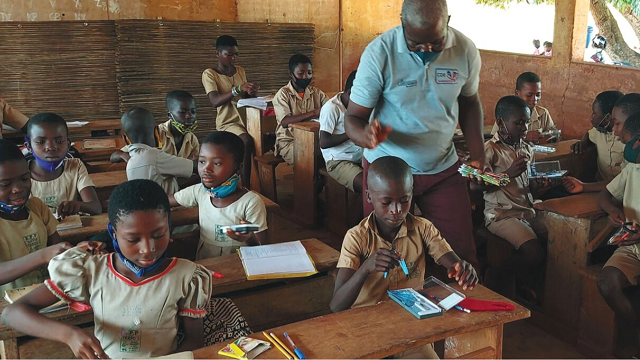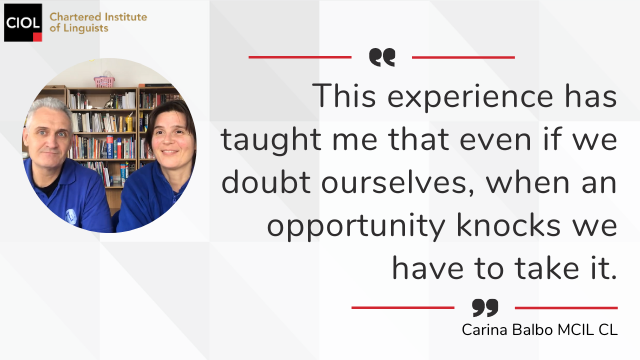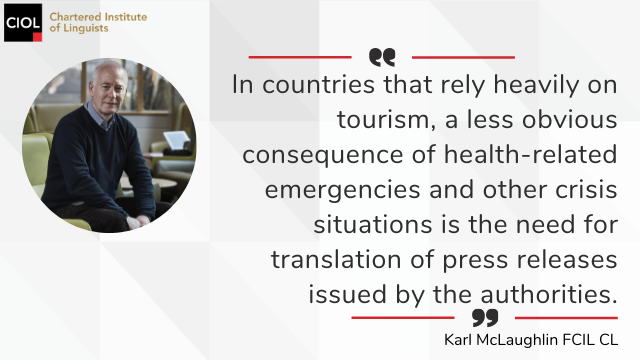-
QUALIFICATIONS
- For Linguists Worldwide
- For UK Public Services
- Preparation
- Policies & Regulation
-
MEMBERSHIP
- Join CIOL
- Membership grades
- NEW for Language Lovers
- Chartered Linguist
- Already a member?
- Professional conduct
- Business & Corporate Partners
-
ASSESSMENTS
- For Second Language Speakers
- English as a Second Language
-
EVENTS & TRAINING
- CPD, Webinars & Training
- CIOL Conference Season 2025
- Events & Networks
- CIOL Mentoring
-
NEWS & VOICES
- News & Voices
- CIOL eNews
- CIOL Awards
- The Linguist
- Jobs & Ads
-
RESOURCES
- For Translators & Interpreters
- For Universities & Students
- Standards & Norms
- CIOL & AI
- All Party Parliamentary Group
- In the UK
- UK Public Services
- Find-a-Linguist
Changing minds
By Holly Langstaff, Nicola Brown, Chris Dobbs and Rebecca Smithson

A new outreach project shows teens choosing their exam options that there’s more to languages than they thought, say Holly Langstaff, Nicola Brown, Chris Dobbs and Rebecca Smithson
A new languages outreach programme aims to change how secondary school students think about language learning. Harnessing the knowledge of expert educators at two of the world’s leading universities, Think Like a Linguist (TLAL)1 takes a collaborative approach to reversing the severe decline in the number of young people studying a language since 2004.
The project helps students aged 12-13 to make informed choices about languages at GCSE through a course of five in-person, interactive sessions with their peers, language professionals, university students and recent languages graduates. Each session focuses on a different aspect of language learning and enables students to consider the question ‘What does it mean to think like a linguist?’ from a unique perspective.
TLAL is run by the Translation Exchange at the University of Oxford in partnership with the languages departments at the universities of Oxford and Cambridge, literary charity the Stephen Spender Trust, and secondary school Hollingworth Academy in Rochdale. It began in 2023 with 30 Year 8 students from six state schools in Rochdale, culminating in a final ‘graduation’ event.
Delivering the sessions
Project partners take turns to deliver sessions on topics including linguistics, creative translation, careers with languages, and the personal and social benefits of multilingualism. A key ambition of Think Like a Linguist is to offer a holistic approach to language learning. Rather than focusing on grammar rules and memorising vocabulary, the sessions aim to develop pupils’ curiosity, strengthen their cognitive and emotional skills, and increase their confidence through collaborative and creative activities. The interventions use research-informed approaches to teaching in order to showcase language learning and its benefits beyond the MFL curriculum.
The content drew on existing resources created by project partners, as well as other delivery and resource partners including WoLLoW, CIOL, Widening Participation at the University of Cambridge and the University of Oxford’s Linguistics Faculty. For Schools Liaison and Outreach Officer Nicola Brown, delivering two of the sessions was a joy. Her introductory session encouraged students to reflect on ways in which they were multilingual in their daily lives, for example when shifting between registers and dialects, or using words inherited from other languages and cultures in our daily lives. The pupils offered interesting and insightful perspectives, and even those who were reluctant to speak at first shone in the more creative activities.
“One of my favourite moments occurred early in the first session when I asked the group to stand up if they heard or spoke a language besides English at home. A good 60% of the pupils stood up and I think we were all a bit surprised! We took a few minutes to delve deeper into pupils’ personal experiences – from sisters studying French at university to parents speaking languages other than English at home – and together we discovered just how much linguistic and cultural diversity there was in the room,” she says.
This short-and-sweet comment from one student shows that the project offers pupils an insight into what language learning really means and where it can take them: “It has made me realise that there is more to languages than I thought.”
Participating in the project
The sessions were hosted by Hollingworth Academy in Rochdale, where students and teachers from the six participating schools met for each session. Chris Dobbs, Head of Academic Enrichment at Hollingworth, reports that TLAL helped pupils to develop greater cultural awareness, resilience and self-confidence, as well as nurturing a passion for languages.
The project helps young people to picture their future selves as language-learners and enables them to value language-based qualifications as something that might be of use in a future career or academic endeavour. One of the sessions focused on careers and the opportunities open to language graduates, featuring talks by student ambassadors and a Cambridge alumnus from the local area.
The project has been conceived as a series of engagements and relies on the assumption that a sustained process – rather than a single event or one-off activity – is more effective in shifting knowledge, beliefs, attitudes and behaviours of young people. A teacher from participating school Unsworth Academy, who accompanied their pupils to the sessions, commented: “Think Like a Linguist made our pupils think more about where languages can take them in the future and opened their minds to the value of language learning in other settings. They particularly enjoyed the interactions with other pupils in the sessions in Hollingworth Academy, and the award ceremony in Oxford was so rewarding – an experience they will never forget.”
The teacher from Holy Family Roman Catholic and Church of England College agreed that the project had helped students to see themselves not only as linguists but as future university students: “It was great to see students from different backgrounds in our area see that they are not restricted when it comes to choosing a place to study in the future, and that institutions such as Oxford and Cambridge are not beyond their reach. This idea was also brought back into school by the five students that participated in the project and so reached a much wider audience. It was also exciting for our students to think about how languages work and the future of languages.”
The graduation event
The first graduation event took place at the University of Oxford as the students were starting Year 9. Jam-packed with educational activities, the day began with lunch and a tour of the college, including the historic library (set in a graveyard!), chapel and common room. Dr Alex Lloyd led a session on ‘how words can change the world’, focusing on the history of the White Rose resistance circle (a group of university students who campaigned against the Nazis). Students discovered the importance of translation in bringing the story of this group to an Anglophone audience. They also tried out Portuguese in a beginners’ language session led by Dr Georgia Nasseh, showing that any language is possible for them.
During the graduation ceremony at The Queen’s College, students shared what they had learnt from the project: their favourite cross-cultural facts, how translation will continue to affect the use of technology, and even a mini-speech in Portuguese! They were each presented with a certificate of their achievements.
The TLAL partners believe that this collaborative approach, which puts the schools and their local area at the heart of the programme, can make a significant difference to the decline in the numbers studying languages across the UK. The project is driven by the belief that we need to show young people what it means to be a linguist and how much it will enrich their lives, rather than simply telling them. It is designed to make these benefits palpable and we are already seeing its impact in the enthusiastic and perceptive responses from the first cohort. Following this successful pilot, Think Like a Linguist will expand to other areas of the UK in 2024.
Nicola Brown is Schools Liaison and Outreach Officer for Modern and Medieval Languages at the University of Oxford.
Chris Dobbs is Director of OxNet Youth Scholars at Pembroke College, Oxford, and Head of Academic Enrichment at Hollingworth Academy.
Holly Langstaff runs outreach initiatives at the Queen’s Translation Exchange and is Lecturer in French at St Edmund Hall, Oxford University.
Rebecca Smithson is Access and Outreach Coordinator at St Edmund Hall, Oxford University, and supports the Think Like a Linguist programme.
Notes
1 Think Like a Linguist (https://cutt.ly/FwCpasiV) was conceived by Charlotte Ryland at the Translation Exchange (Oxford), Jon Datta at Widening Participation (Cambridge) and Chris Dobbs at Hollingworth Academy (Rochdale). We are grateful to all who have become involved and look forward to bringing TLAL to new communities in the years to come.
Image shows Think Like a Linguist participants at the graduation ceremony in Oxford
This article is reproduced from the Spring 2024 issue of The Linguist. Download the full edition here.
More
The Chartered Institute of Linguists (CIOL), Incorporated by Royal Charter, Registered in England and Wales Number RC 000808 and the IoL Educational Trust (IoLET), trading as CIOL Qualifications, Company limited by Guarantee, Registered in England and Wales Number 04297497 and Registered Charity Number 1090263. CIOL is a not-for-profit organisation.








